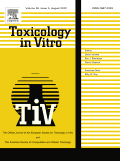
TOXICOLOGY IN VITRO
metrics 2024
Exploring the Frontiers of In Vitro Toxicology
Introduction
TOXICOLOGY IN VITRO is a premier journal published by PERGAMON-ELSEVIER SCIENCE LTD, focusing on the latest advancements in the field of toxicology, particularly through in vitro methodologies. With an ISSN of 0887-2333 and an E-ISSN of 1879-3177, this journal serves as a critical platform for researchers aiming to disseminate their findings in toxicology, emphasizing innovative approaches and applications in pharmacology and toxicology. Featuring a commendable impact factor and classified in the second quartile (Q2) for both Medicine (miscellaneous) and Toxicology in 2023, the journal holds a significant position within the academic community, ranking 41st out of 133 in the Toxicology category according to Scopus, representing the 69th percentile. Despite being a subscription-based publication, it continuously attracts submissions from leading scientists worldwide, fostering a vibrant exchange of scientific knowledge. Since its inception in 1987, TOXICOLOGY IN VITRO has consistently aimed to enhance understanding of toxicological challenges, making it an invaluable resource for professionals, students, and researchers dedicated to developing safer pharmaceuticals and understanding the biological pathways influenced by potential toxic agents.
Metrics 2024
 0.66
0.66 2.60
2.60 2.80
2.80 125
125Metrics History
Rank 2024
Scopus
IF (Web Of Science)
JCI (Web Of Science)
Quartile History
Similar Journals
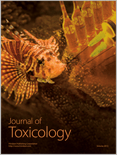
Journal of Toxicology
Bridging research and regulation in toxicology.Journal of Toxicology, published by HINDAWI LTD, stands as a pivotal open-access journal in the fields of toxicology and pharmacology since its inception in 2009. With an ISSN of 1687-8191 and an E-ISSN of 1687-8205, this journal is dedicated to disseminating high-quality research that critically examines the effects of toxic substances on living organisms. Located in Egypt and operating from their London office, it aims to provide an extensive platform for researchers worldwide to share findings that can inform better practices in safety and regulation. As of 2023, it has achieved significant recognition, holding a Q3 ranking in both the pharmacology and toxicology categories, and is indexed in Scopus with noteworthy percentile rankings (Toxicology: 57th and Pharmacology: 55th). With a focus on innovative studies and emerging areas such as environmental toxicology, biomarker research, and therapeutic interventions, the Journal of Toxicology invites both experienced researchers and students to contribute, thereby enhancing the breadth and depth of toxicological knowledge for the global scientific community.

Current Research in Toxicology
Navigating the Landscape of Toxicological DiscoveryCurrent Research in Toxicology is a pioneering journal published by ELSEVIER that serves as a vital platform for disseminating cutting-edge research in the field of toxicology, spanning from biological impacts to pharmacological applications. With an ISSN of 2666-027X and an impressive Q2 ranking in key categories such as Applied Microbiology and Biotechnology, Health, Toxicology and Mutagenesis, and Toxicology, this journal underscores its commitment to high-quality research and significant contributions to the scientific community. Based in the Netherlands, Current Research in Toxicology aims to bridge the gap between academia and industry by providing rigorously peer-reviewed articles that cover a wide array of topics including novel methodologies, regulatory challenges, and emerging trends within the domain. The journal is accessible through various platforms, making it essential for researchers, professionals, and students eager to stay updated on the latest findings and advancements in toxicology. With a comprehensive focus on integrating theory with practical application, this journal is poised to influence future studies and policies in health and environmental science.
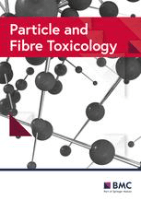
Particle and Fibre Toxicology
Innovating research in environmental health.Particle and Fibre Toxicology is a leading open-access journal dedicated to advancing the field of toxicology, specifically focusing on the health impacts of particulate matter and fibers. Published by BMC since 2004, this journal operates from its offices in the United Kingdom and has gained significant recognition in the scientific community, achieving an impressive impact factor that highlights its relevance and influence. As indicated by its Q1 ranking in various categories including Health, Toxicology and Mutagenesis and Medicine (miscellaneous), it occupies a prestigious position in the academic landscape, appealing to researchers, professionals, and students alike. With a Scopus ranking of #4 in Toxicology and #7 in Environmental Science, the journal ensures high visibility and accessibility, providing a platform for the dissemination of key research findings and innovative methodologies in the interdisciplinary domains of toxicology. Through its commitment to open access, Particle and Fibre Toxicology fosters knowledge-sharing and collaboration, facilitating significant advancements in our understanding of the toxicological effects of environmental agents.
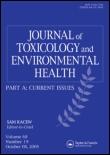
JOURNAL OF TOXICOLOGY AND ENVIRONMENTAL HEALTH-PART A-CURRENT ISSUES
Pioneering Insights into Human Health and Environmental AgentsJOURNAL OF TOXICOLOGY AND ENVIRONMENTAL HEALTH-PART A-CURRENT ISSUES, published by Taylor & Francis Inc, stands as a key resource in the interdisciplinary field of toxicology and environmental health. Operating under the ISSN 1528-7394 and E-ISSN 1087-2620, this journal maintains a strong presence with a Q2 category ranking in Health, Toxicology and Mutagenesis and a Q3 ranking in Toxicology as of 2023. It aims to disseminate critical findings that address contemporary issues in toxicology and environmental health, emphasizing the implications of environmental agents on human health. The journal offers both subscription and open access options, making cutting-edge research accessible to a diverse readership. With coverage of key topics from 1998 to 2024, it is an essential platform for academics, professionals, and students seeking to stay at the forefront of environmental health sciences.
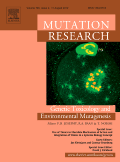
MUTATION RESEARCH-GENETIC TOXICOLOGY AND ENVIRONMENTAL MUTAGENESIS
Pioneering insights into genetic alterations and their ecological implications.MUTATION RESEARCH-GENETIC TOXICOLOGY AND ENVIRONMENTAL MUTAGENESIS, published by Elsevier, is a renowned journal that explores critical advancements in the field of genetic toxicology and environmental mutagenesis. With an ISSN of 1383-5718 and an E-ISSN of 1879-3592, it ranks in Q3 for Genetics and Q2 for Health, Toxicology, and Mutagenesis as of 2023. This journal not only emphasizes the importance of environmental factors in genetic material alterations but also disseminates significant research findings that aid in understanding the implications for public health and safety. Operating from Amsterdam, Netherlands, it serves as a pivotal platform for researchers, professionals, and students, fostering an informed community keen on evolving the parameters of genetic research. Although it currently does not offer open access, the journal's commitment to high-quality peer-reviewed content ensures substantial contributions to the academic literature, enhancing our comprehension of mutagenic processes and their environmental triggers.
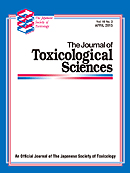
JOURNAL OF TOXICOLOGICAL SCIENCES
Pioneering Studies in Toxicological ScienceThe Journal of Toxicological Sciences, published by the Japanese Society of Toxicological Sciences, is a prominent academic journal dedicated to the comprehensive study of toxicology and its related fields. Since its inception in 1976, the journal has provided a vital platform for researchers and professionals to disseminate innovative findings and insights in toxicology, with a focus on both experimental and clinical studies. Positioned in the Q3 quartile across various relevant categories, including Medicine (miscellaneous) and Toxicology as of 2023, the journal plays an essential role in advancing our understanding of toxic substances and their effects on biological systems. Although currently not open access, the journal maintains high academic standards and is indexed in Scopus, ranking #96 in Toxicology. Offering unique perspectives from Japan, it encourages global collaboration and discourse among toxicologists, making it an invaluable resource for students, researchers, and industry professionals alike.
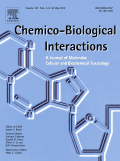
CHEMICO-BIOLOGICAL INTERACTIONS
Illuminating Chemical and Biological SynergiesCHEMICO-BIOLOGICAL INTERACTIONS is a premier journal published by Elsevier Ireland Ltd, dedicated to advancing the field of chemical and biological interactions since its inception in 1969. With a robust focus on pharmacology and toxicology, the journal holds a prestigious Q1 ranking in both Medicine (miscellaneous) and Toxicology, reflecting its significance in disseminating influential research. As part of the Scopus database, it ranks #21 out of 133 journals in Toxicology, positioning it in the 84th percentile and ensuring high visibility for cutting-edge studies. This scholarly platform serves as a crucial resource for researchers, professionals, and students who seek reliable and innovative findings at the intersection of chemistry and biology. While currently not open access, CHEMICO-BIOLOGICAL INTERACTIONS provides a comprehensive collection of articles that contribute to the ongoing dialogue in toxin research and its implications on medicinal chemistry, thereby fostering advancements in public health and safety.
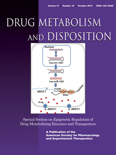
DRUG METABOLISM AND DISPOSITION
Advancing the Science of Drug MetabolismDrug Metabolism and Disposition is a premier journal published by the American Society for Pharmacology and Experimental Therapeutics, focusing on crucial advancements in the fields of pharmaceutical sciences and pharmacology. Since its inception in 1973, this esteemed journal has established itself as a leading platform for innovative research, earning a prestigious Q1 rating in both Pharmaceutical Science and Pharmacology categories as of 2023. With an impressive Scopus ranking of #52 out of 183 in Pharmaceutical Science and #105 out of 313 in Pharmacology, it occupies a vital place in an increasingly competitive academic landscape. Researchers, professionals, and students alike benefit from its rigorous peer-reviewed articles that delve into drug metabolism processes and their physiological implications, making it an indispensable resource for anyone aiming to advance their understanding of drug disposition and efficacy. This crucial journal contributes significantly to the ongoing dialogue in pharmacology and toxicology, providing insights that help shape future therapeutic strategies and regulatory policies.
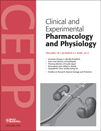
CLINICAL AND EXPERIMENTAL PHARMACOLOGY AND PHYSIOLOGY
Fostering Collaboration for Transformative Medical InsightsCLINICAL AND EXPERIMENTAL PHARMACOLOGY AND PHYSIOLOGY, published by WILEY, is a premier journal that serves as a vital resource for researchers, professionals, and students in the fields of pharmacology and physiology. With ISSN 0305-1870 and E-ISSN 1440-1681, this journal has established itself as a significant contributor to scientific dialogue since its inception in 1974. Currently spanning until 2024, it consistently publishes cutting-edge research addressing both experimental and clinical advancements in pharmacology and physiology. Recognized for its quality, it holds a Q2 ranking in the 2023 Pharmacology category and notable Q3 rankings in both Physiology and Medical Physiology. The journal's coverage of topical issues not only ensures a robust platform for innovative findings but also fosters collaborations across disciplines. Although not an Open Access journal, its curated content is invaluable for advancing knowledge, as evidenced by its solid Scopus rankings, which place it within the top percentiles of its field. Engaging with this journal means staying at the forefront of research that shapes clinical practices and experimental methodologies.
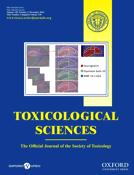
TOXICOLOGICAL SCIENCES
Unraveling Toxicity to Safeguard Our FutureTOXICOLOGICAL SCIENCES, published by Oxford University Press, is a premier journal in the field of toxicology that has been a cornerstone of scientific discourse since its inception in 1981. With an impressive 2023 impact factor and ranked in the Q1 category for Toxicology, this journal is highly regarded among researchers, professionals, and students dedicated to pharmacology and toxicology. The journal is committed to advancing the understanding of toxicological science, covering a breadth of topics that include the mechanisms of toxicity, risk assessment, and the regulatory aspects affecting public health. With an ISSN of 1096-6080 and an E-ISSN of 1096-0929, TOXICOLOGICAL SCIENCES facilitates open access scholarly work, ensuring that critical research reaches a global audience and promotes collaborative learning. As it converges towards 2024, the journal remains pivotal in shaping the future of toxicology research, providing insights that are essential for developing safer chemicals and protecting environmental health.